It’s that time of year when Latter-day Saint boys everywhere are called upon to stand up in sacrament meetings to be admired and recognized by their congregations for their annual priesthood advancements. In some instances, the male leadership will notice a disparity between the public recognition the boys and girls in their ward are receiving. These men might also ask the girls to stand and be admired for their important accomplishments, which include being alive for another year within the ward boundaries. Their duties, responsibilities and importance to the ward remain unchanged, because they are still nothing. While the boys usher the doors, collect fast offerings and bless and pass the sacred emblems of the sacrament, the girls sit reverently and watch them perform their duties. Many members feel that having them both stand to be recognized on the first Sunday in January (if they are) is enough to erase any disparity between the two groups for the rest of the year.
This got me thinking about the renaming of the girls’ classes from Beehive, Mia Maid and Laurel to “12- & 13-year-old class”, “14- & 15-year-old class”, and “16- & 17-year-old class”. (These new class names roll right off the tongue just like saying “I’m a member of The Church of Jesus Christ of Latter-day Saints” does.)
This was supposed to make things less confusing, especially in countries where those words didn’t translate from English very well. The names of the boys’ classes remained unchanged, though: deacon, teacher and priest. I guess those were not confusing internationally in the minds of our male church leaders.
But much more confusing to me than the cutesy word “beehive” is when we call an 18 year old boy an “elder”, or a 14 year old child with no education degree or teaching certification whatsoever a “teacher”. In other religions to become a “priest” a man must permanently forsake all family life and romantic pursuits, complete years of full-time seminary and make a lifelong commitment to serving the Lord. In our church, you just have to be a 16 year old boy who can read a scripted prayer into the microphone once a week at church.
Deacons are now as young as (and sometimes barely) eleven years old, but are told that after a brief ceremony with hands placed on their heads and a prayer that they now have more authority in just their little finger than the Pope. That’s ripe with the possibility for an overinflated young male ego, which I experienced years ago when a friend’s 12 year old son walked around my kitchen discussing out loud how cool it was that he now possessed the literal power of God and could call on the heavens to back his authority at any time. Holding my tongue, I recognized in his words the teachings he’d received from both his dad and his church leaders, and I wondered what it would’ve been like to have been so young and thought I was so incredibly important. (But I was a girl, so at age 12 I just had activities on how to babysit, and lessons on how to support my future husband in his important priesthood duties.)
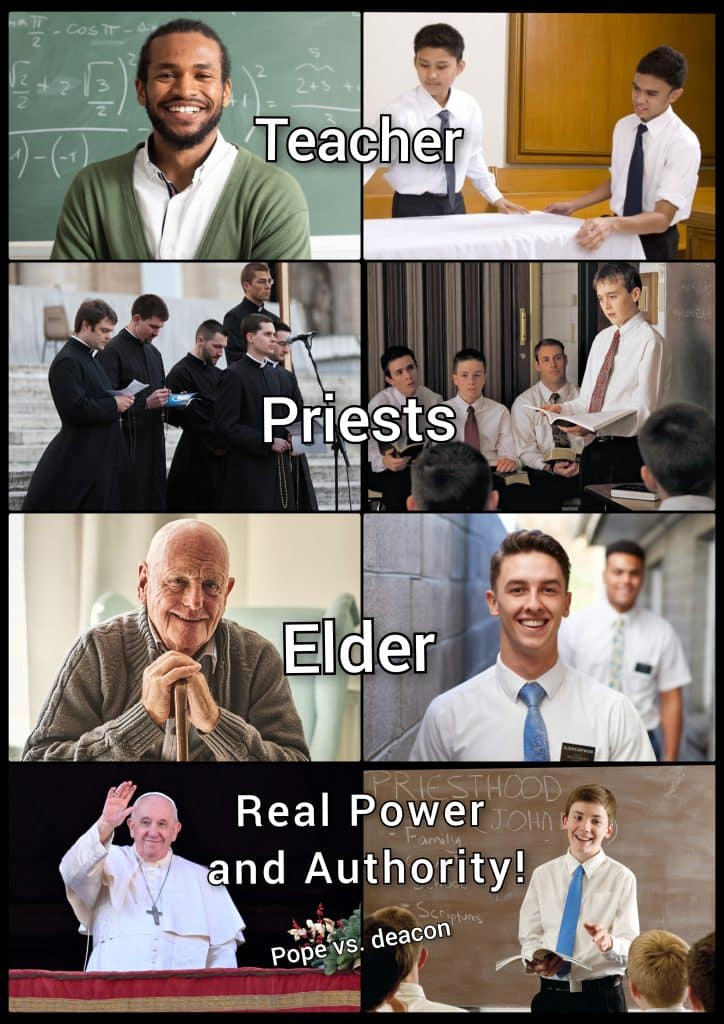
The only similarly overinflated ego trip I can come up with as a young woman was being able to say I’d graduated from seminary, because in most other parts of society that would denote the completion of a doctorate level degree in theology. Unfortunately, I’ve lived in Utah my entire life and absolutely no one thinks that when I mention my four years as a seminary student. (And nobody told me that after doing so I could then speak on behalf of God or heal someone from cancer, while 18-year-old boys on their missions do believe they have that power.)
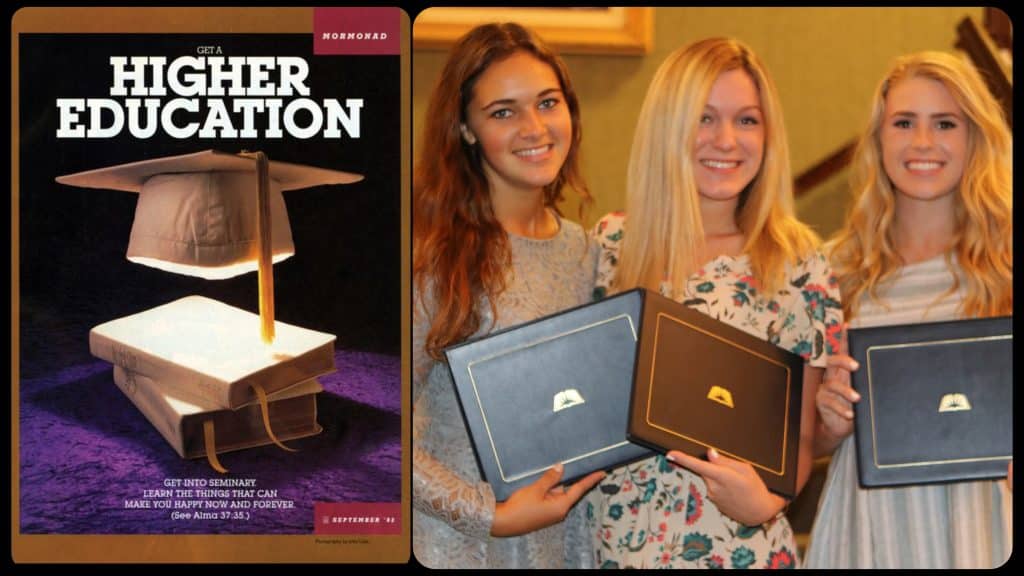
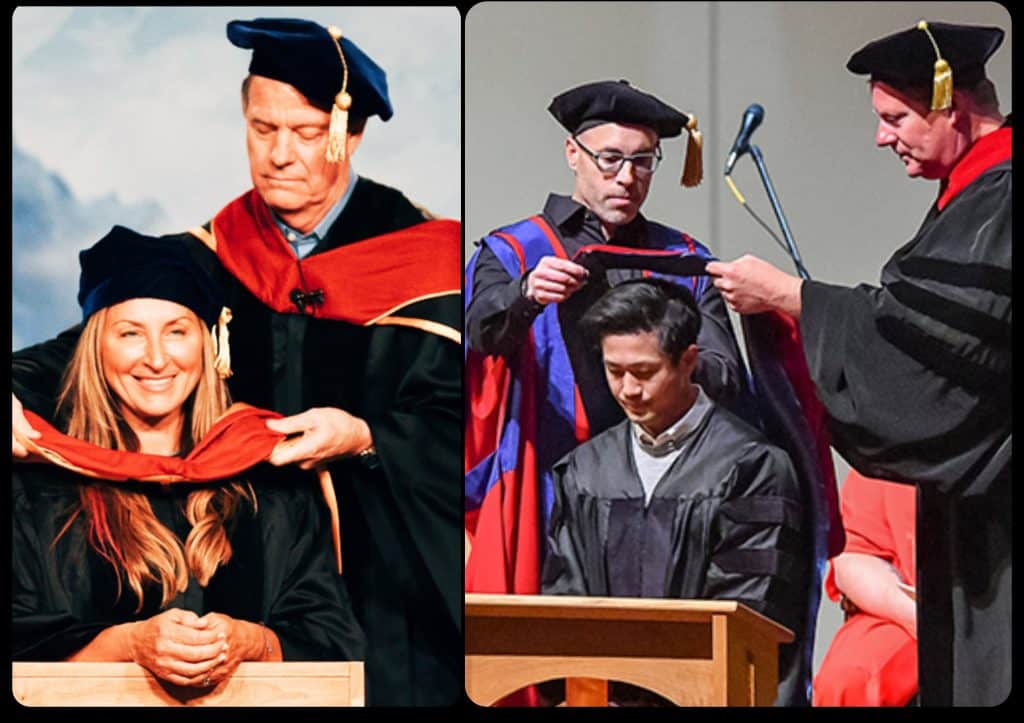
Recently a woman visited her family for the holidays and pulled out an old church book from their shelves. She then shared several humorous (and frustrating) pages with an online group we’re both in. One chapter in this popular George Durrant book stood out to me. It was called, “The Priesthood Makes You Special”.
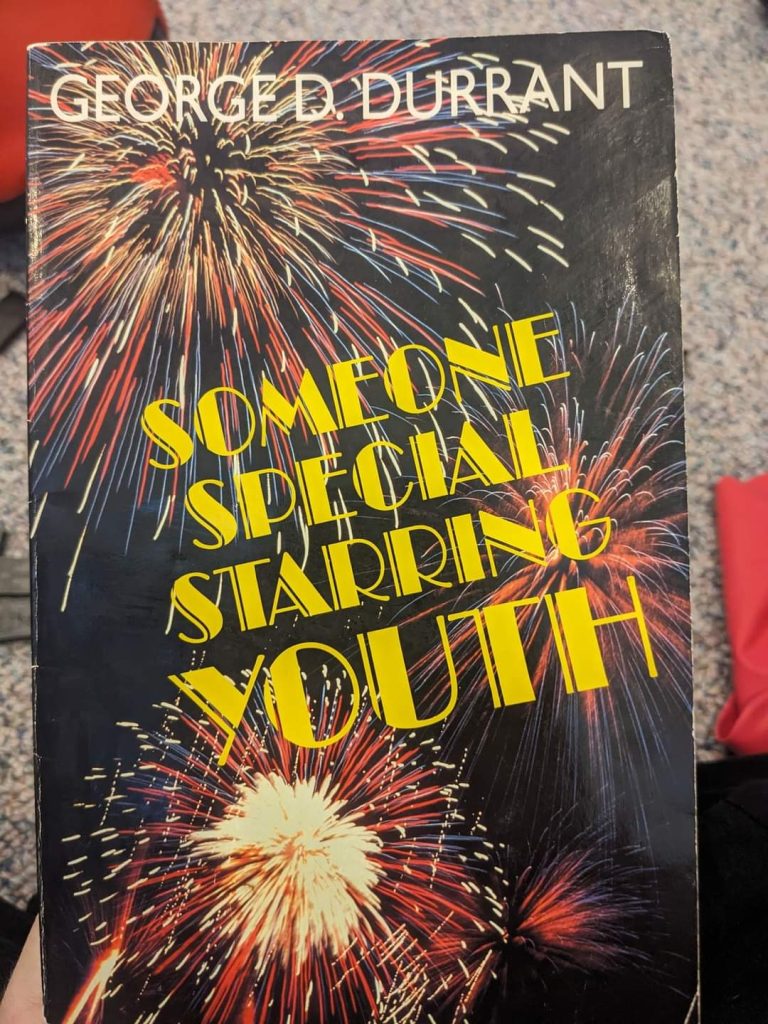
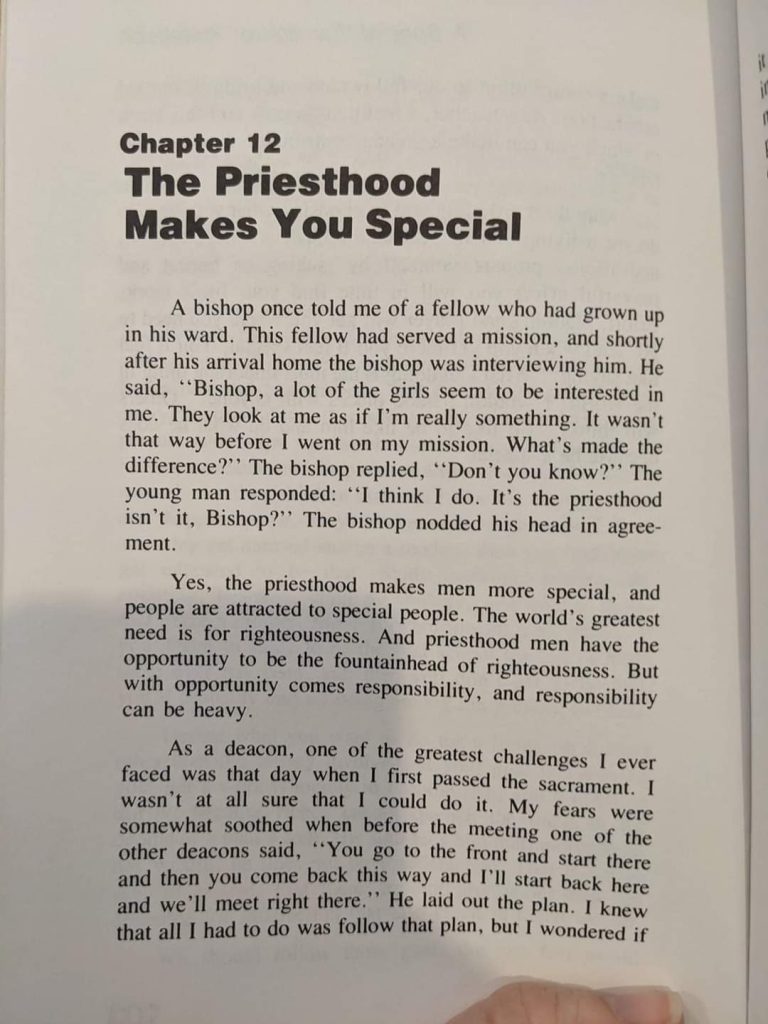
In a more recent book, Joanna Brooks shares her experience as a young Mormon girl watching the boys around her be ordained to the priesthood and compared what she got as a girl.
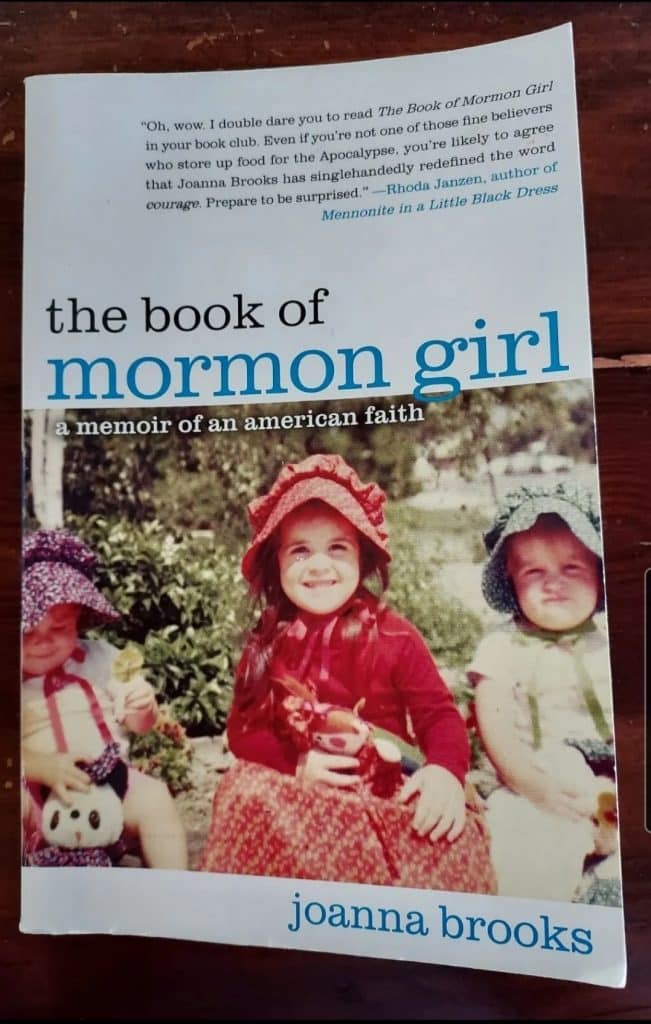
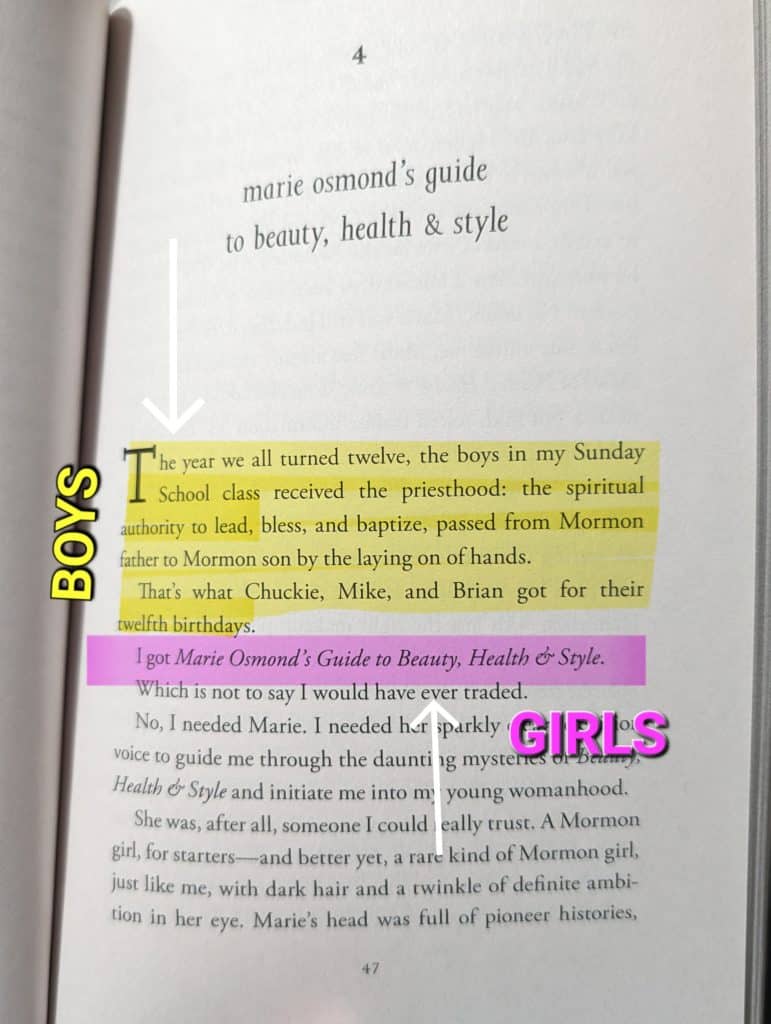
Before I read this book in late 2012, I listened to a radio interview with Joanna. Her words had resonated with me and I found her very likable. Unfortunately, at this point in my life her book didn’t hit me the same way, despite me being right on the cusp of a colossal paradigm shift in my beliefs about women and the church. My initial thoughts were, “What’s the big deal that her friends got the Priesthood and she didn’t? The priesthood is for boys.” Her ideas and perception of reality made no sense to me, and my Goodreads review from back then says I was confused and disappointed in the book, and that it had “tanked for me”. Literally less than a year later I would begin to see everything very differently and actively begin to push for equality for girls growing up in the church.
I explain those feelings because if you sat in church on Sunday and felt unbothered when only the boys stood for recognition (or if both the boys and girls stood, but you didn’t feel there was a discrepancy in their value), I was right there with you once. Almost all of us who actively speak out about needed changes to benefit the next generation of LDS girls were once very satisfied with the status quo too. It’s hard to predict what will be the thing that finally shifts someone’s perspective, but maybe this issue could be it for you.
You see, if it’s wrong for girls to aspire to positions of church authority or to ask for the priesthood to be extended to them, why is it celebrated when boys do the exact same thing? And why are the young men publicly honored for wanting to be ordained to the next priesthood office when girls are shamed for even wondering what it would be like to hold that kind of power from God?






16 Responses
That’s why I love being in a liberal European ward where this nonsense has been questioned decades ago and is no longer part of our life.
They still use the titles deacon, teacher, priest and elder for the young men in Europe though, don’t they? Tell me if I got that wrong. I really thought they changed the young women’s class names but left the young men’s the same everywhere.
I would also be curious to hear how the culture is different/better there. It feels like it would have to be very much the same, because it’s not as if girls are ordained in other places.
Would love to hear more about what it’s like in your area. ♥️
Thanks Abby for always drawing attention to the absurd practices in our church. I’m sure plenty of people will say that that book by George Durrant was never doctrine, whatever that means. But teachings like that affected all the men our age and older. And those are the men in charge today.
I’m right in the trenches with you, Cynthia! There are so many things that weren’t official doctrine but absolutely seeped into our lives experiences anyway
Thank you for this post. As a later Boomer I began going to “Mutual” around the time that second wave feminism was starting to really take off. I took to feminism immediately because I was aware even in Primary that boys and men were treated differently than girls and women and it made me mad. Thank goodness that I had a strong grandmother who’d marched in suffragette parades with her mother and older sisters and who encouraged me to continue to be the independent person I’d been since I was born (much to my mother’s dismay).
Even though I grew up in an “equal opportunity household” where my brothers knew how to and actually did housecleaning, cooking, basic sewing skills and babysitting and my sister and I could do basic home repairs, basic car maintenance, personal and family finances and were given personal autonomy and leadership positions within my own family once I went to church, especially YW, I was treated as a helpless female who sat through lame lessons about temple marriage and honoring my future husband’s Priesthood while my male counterparts were playing basketball or volleyball as well as doing cool things that had nothing to do with church. Only one other girl in my age group felt like me. We were considered to be abnormal and unwomanly for wanting to get a college education because we wanted to have a meaningful life after graduation.
I met even more pompous ass men at BYU and in my YSA wards. They were insufferable! I even got engaged to one who seemed enlightened until one day he gave me the standard “I’m the Priesthood and you have to obey me” garbage. That was the end of my engagement. When I dated nonmember or inactive Mormon men and interacted with them at work I was much more respected as a person.
I eventually married a man who’d been inactive much of his life outside of the temple to the horror of my extended family. He has treated me with the love, support and respect that my sister and many female relatives and friends have not ever received from their “righteous Priesthood holder” husbands. We raised our two sons to respect women and encourage them to become all that they can be as well as to advocate for female equality in all aspects of life. I’m no longer active in the church due to both the horrific fallout from polygamy and patriarchy on both sides of my family which have left deep scars that my generation and the younger ones are working through to put behind us and the unconscionable treatment of females in the church.
The priesthood, if properly understood, does not make a boy special or give him power. It should make him humble. It should teach him to be like Jesus when he washed his disciple’s feet. A servant instead of a boss type leader. Washing feet was normally the job of the lowest servant in the household. And in all my time in the church, I have found few men who understand that. The vast majority have been taught that it puts them above others, as a leader who gets to tell others what to do. They have been taught that it gives them power, instead of allows them to call upon God’s power. They have been taught it gives them a bat phone to God, rather than teaching them that God will answer prayers for anyone who asks, so they think their ideas are more inspired than a woman’s ideas could possibly be, so they don’t need to listen to women because God will tell them what women need.
One stake president who had the picture of Christ washing his disciples feet hanging in his office once told me that it wasn’t his job to get answers for me, but to love me enough that I would trust God enough to get my own answers. I tried to tell a friend that once, and she thought I was rebelling against priesthood authority, hung up on me and ghosted me. Um….over being respected by my priesthood authority? Her idea of priesthood was that he was some kind of ruler over me and I should obey, and his idea of priesthood service was unthinkable because he treated me as some kind of worthwhile human being.
So, part of the problem is that the church teaches a very unChristlike view of priesthood. It produces arrogant jerks rather than priesthood servants. And no wonder women want to get out from “under” the priesthood leadership. We are not listened to or treated as equals because they all see their priesthood as special and think women incapable of inspiration.
If the priesthood is supposed to make them humble servants, why were the girls the ones learning how to sew, cook and clean at our activities – for use to take care of our husbands in the future?
I would love to see a ward where the boys give up their activity budgets to the girls so the young women could go do all the fun things – while the boys stay behind to clean the church and prepare a meal for them when they return from their fun outing – like the servants they supposedly are learning to be.
May I ask how old you are? Or maybe the discrepancy in our respective experiences is due to the fact that I did not grow up in Utah. Believe me, I’m on board with the idea that patriarchy hurts women and the church community in ways that most are loathe to acknowledge, however, when I read critiques, they often feel so outdated. I have no idea how to sew. I’m a terrible cook and certainly never had any activities on how to clean (probably because as a members of class leadership, we planned and carried out our own activities.) Growing up in western Washington, we did a ton of camping, hiking, and outdoor activities. I guess I have less of a negative reaction to male ordination because I always assumed women don’t really need that kind of stuff. No one ever made me feel like I don’t have direct access to God or that I’m less powerful. Well, I take that back. I have had eye-rolling experiences with some male leaders similar to what is described in the article. But as much as the “all-in” crowd could better acknowledge and confront the issues discussed here, detractors would be better off recognizing that their experiences aren’t universal.
Inga – I turn 43 this year, so I was a teenager in Utah in the 90s. I would not be unsurprised to hear that you had a very different experience growing up somewhere else – in fact, I think it has more to do with individual ward and stake leadership than anything. I’m sure there were heavenly wards in pockets in Utah in the 90s as well.
I loved my leaders – but we were in the heyday of Homemaking meetings for women and the aftermath of President Benson’s “To the Mothers in Zion” talk in 1987 where women were told in no uncertain terms that their only righteous option in life was to become a full time stay at home mother. And for me, no matter how many leaders might’ve made me feel empowered or important in God’s plan, I still saw the boys doing all of the blessing, baptizing, presiding and leading (from the ward level to the general level) and took my cues from that.
I was thinking more about your comment and how the idea that Priesthood is supposed to be about humble service, not public glory. I have come back to add more.
My husband is in the military. I’ve been home with kids for three separate year+ deployments of his to the Middle East. Each time he goes somewhere for any length of time, we both work very hard. Being in Iraq in the heat is hard. Being with little kids 24/7 is hard.
However, my hard work (women’s work) is rarely recognized or acknowledged. His work is very recognized and acknowledged. At his homecomings the news shows up to interview him and get footage of him reuniting with his kids – but nobody cares about footage of the kids with the mom that kept them alive on her own for the past year. People pay for his dinner when he’s out in uniform. People clap as he and other soldiers walk past in the airport. Restaurants offer him free meals on Veterans Day. Most people don’t even consider I exist unless they know me personally – it’s always about the soldier and his portion of the family sacrifices.
I feel like there are similarities to between being a military spouse and being say, a bishop’s spouse. They both sacrifice and work hard, but the wife’s labor becomes invisible to most of the ward, who bring treats to the bishop’s office when he’s staying late and sing songs about how great he is in primary.
Everybody serves – but men’s service tends to be the more publicly recognized and praised. Could the average church member even identify photographs of the apostle’s wives?
If the priesthood is supposed to make men the lowest servants of everyone else, why are they the ones who get all of the recognition for their work, beginning when they are barely deacons and stand up to be recognized in church the first Sunday in January?
Like I said, the church is teaching a very unChristlike version of priesthood. They are teaching the glory kind, how it makes boys special. If the boys are special, then the girls are less than. So, just read your New Testament and see how Christ was. He was not out claiming glory, but walking and eating with the poor, healing the sick, and serving as only he could do. The church is teaching it jackass backwards because “it is the nature of most men, when they get a little power as they suppose.” Even Joseph Smith loved the glory of being a leader. He loved the power to declare himself General of an army and other power trips. I have seen so few Mormon men who see the priesthood as a call to serve and to love others instead of a call to be served and be loved by others. Look how elder Bednar loves the audience to stand for him. He is loving his priesthood because he gets glory instead of giving the glory to God. The priesthood should be a call to serve, instead men have made it into a selfish way for them to be better than others. The church is teaching it all wrong. They are teaching the boys it makes them special, rather than that it makes God special. It isn’t their priesthood. It is God’s. And when they use their priesthood to glory over others, or be better than others, or boss theirs, amen to the priesthood of that man. But we don’t do that in the church. We encourage them to think priesthood makes them heroes, rather than priesthood should make them Christlike. Think, why didn’t the Jews recognize their Savior? Because he was humble, not a glorified hero. They expected a war hero to throw off the Romans and claim glory. Christ didn’t. He called himself the son of man, not the king of the universe. Get to know Jesus and you see the Mormon concept of priesthood is wrong.
Any your husband is lucky to be a Gulf war vet, not a Vietnam vet. They wore their uniform in the airport and got spit on. Your generation of military won’t understand that, but it was real. During Vietnam, they were told, do not wear your uniform into town. You will get mugged. My husband refused to ever travel in uniform, ever. Even today, 30 years after retiring, he will not claim the free meals or claim any military status in public settings even though he put in 20 and retired military. He being a Vietnam age military, he was never given the glory, so his attitude is one of serving one’s country more than being a war hero. I think that is part of why he sees priesthood as service instead of power….well that and being married to me. I grew up resenting the boys being “special” and did not tolerate that attitude.
Yes, Vietnam was completely different. What soldiers and families went through was terrible, and it doesn’t compare the way military is treated today. I also know of Vietnam vets who won’t get free meals or participate in memorials, and I understand why. It seems so unfair to me, especially when so many of those young men were drafted and didn’t even have a choice. It’s fine to hate a war, but why hate on the poor kids who had to go suffer, watch their friends die, and come home with lifelong debilitating issues? We have a close family friend who passed away a couple years ago from the after-effects of agent orange, after having his legs amputated a few years before passing away. The Vietnam war was a nightmare – my experience doesn’t compare as a modern military spouse.
I’m a veteran AND was a military spouse. I cringe when wives of men that have busy priesthood callings, such as bishop or stake president, mention how little they see if their husband. On the one hand, I totally get it, because by default the wife is doing everything. But on the other hand, military wives would be thrilled to see their husbands for even just a couple of hours a month during a deployment. My husband’s deployments were before video, conferencing, and FaceTime, and we were never around family. It was brutal. I hear you.
Amen. Truly. This is so important and I feel like I’m constantly dismissed when I bring it up. It matters in so many ways that we ignore.
I’ve been meaning to comment on this all week! We had one deacon who was ordained a week earlier than all the other boys. (I think family was in town or something like that.) I was with my son in his Sunday School class and that deacon was jokingly saying things like along the lines of “I’m better than you guys because I’m already a deacon.” I know he was joking, but I wasn’t going to tolerate that line of thought – even as a joke.
From across the room I said, “Part of having the priesthood is not lording it over other people. You need to be more humble.” One of the other adults in the room backed me up and said “Yeah, that’s not something we joke about.”
Hopefully that kid learned a little bit more about how to act as a priesthood holder. But honestly, I don’t blame him for thinking that he could brag about the priesthood. He’s been told his whole life that the priesthood makes him special.
I think it’s pretty normal for a child being ordained to be too immature to not act like a dufas about it. Some of them were ten years old just a few days before being ordained!
Why do we give immature little boys more power than we give adult women in the church??